Impact of Detention on Asylum Seekers' Health in Processing Centers
VerifiedAdded on 2020/11/23
|5
|1001
|334
Essay
AI Summary
This essay examines the complex issue of detaining asylum seekers and refugees in processing centers, despite the advice of health professionals. It highlights the challenges faced by healthcare systems in providing adequate care to this vulnerable population, focusing on the physical and mental health impacts of detention. The essay discusses the Australian government's "Operation Sovereign Borders" and its implications for asylum seekers, as well as the ethical and legal considerations surrounding their treatment. It emphasizes the need for an integrated network involving governments, international organizations, and other sectors to address the situation and ensure that asylum seekers' rights to a normal life are respected. The essay also touches upon the potential for bio-medical approaches to improve the lives of those confined to these centers, promoting dignified existence and livelihood opportunities. Desklib provides access to similar essays and solved assignments for students.
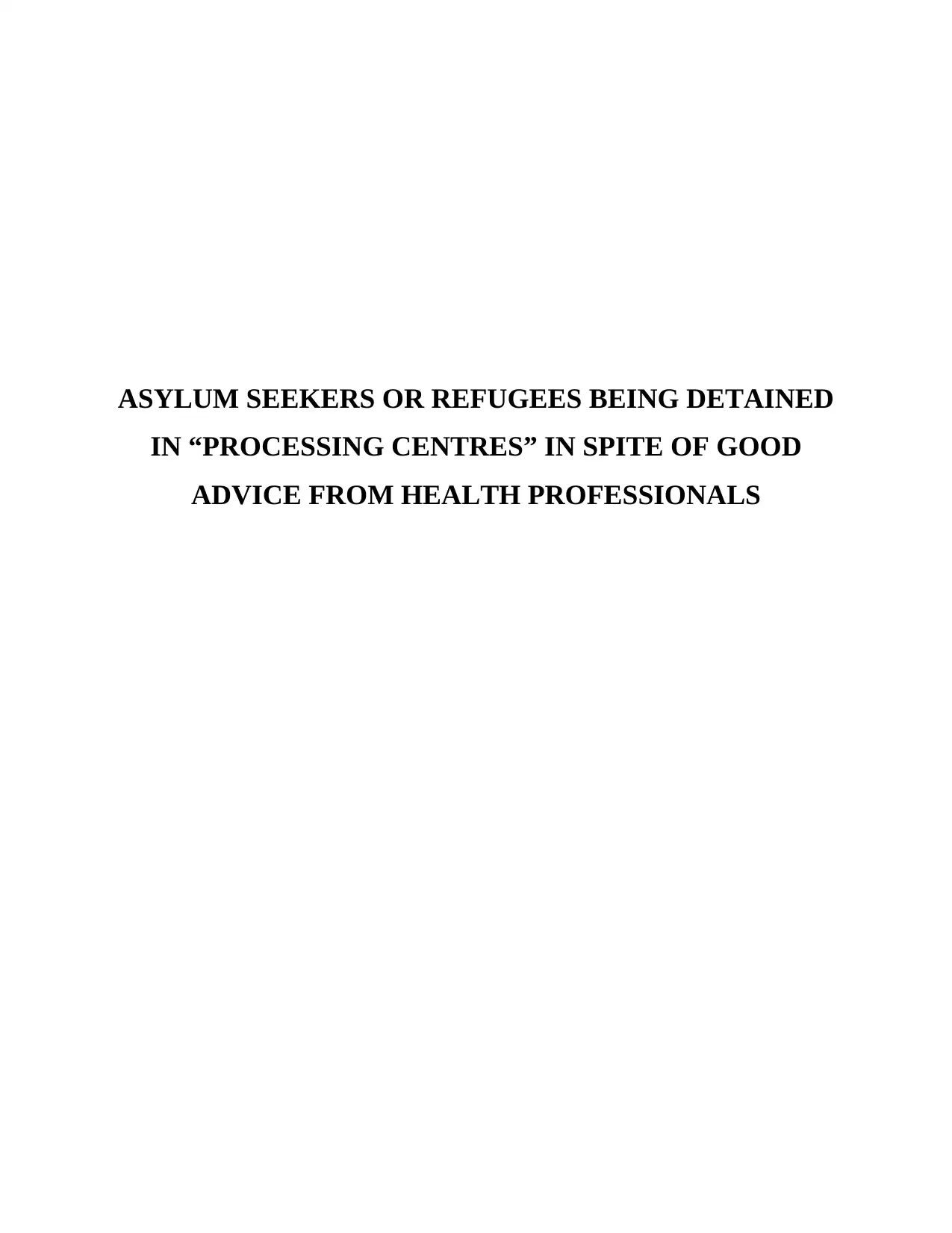
ASYLUM SEEKERS OR REFUGEES BEING DETAINED
IN “PROCESSING CENTRES” IN SPITE OF GOOD
ADVICE FROM HEALTH PROFESSIONALS
IN “PROCESSING CENTRES” IN SPITE OF GOOD
ADVICE FROM HEALTH PROFESSIONALS
Paraphrase This Document
Need a fresh take? Get an instant paraphrase of this document with our AI Paraphraser
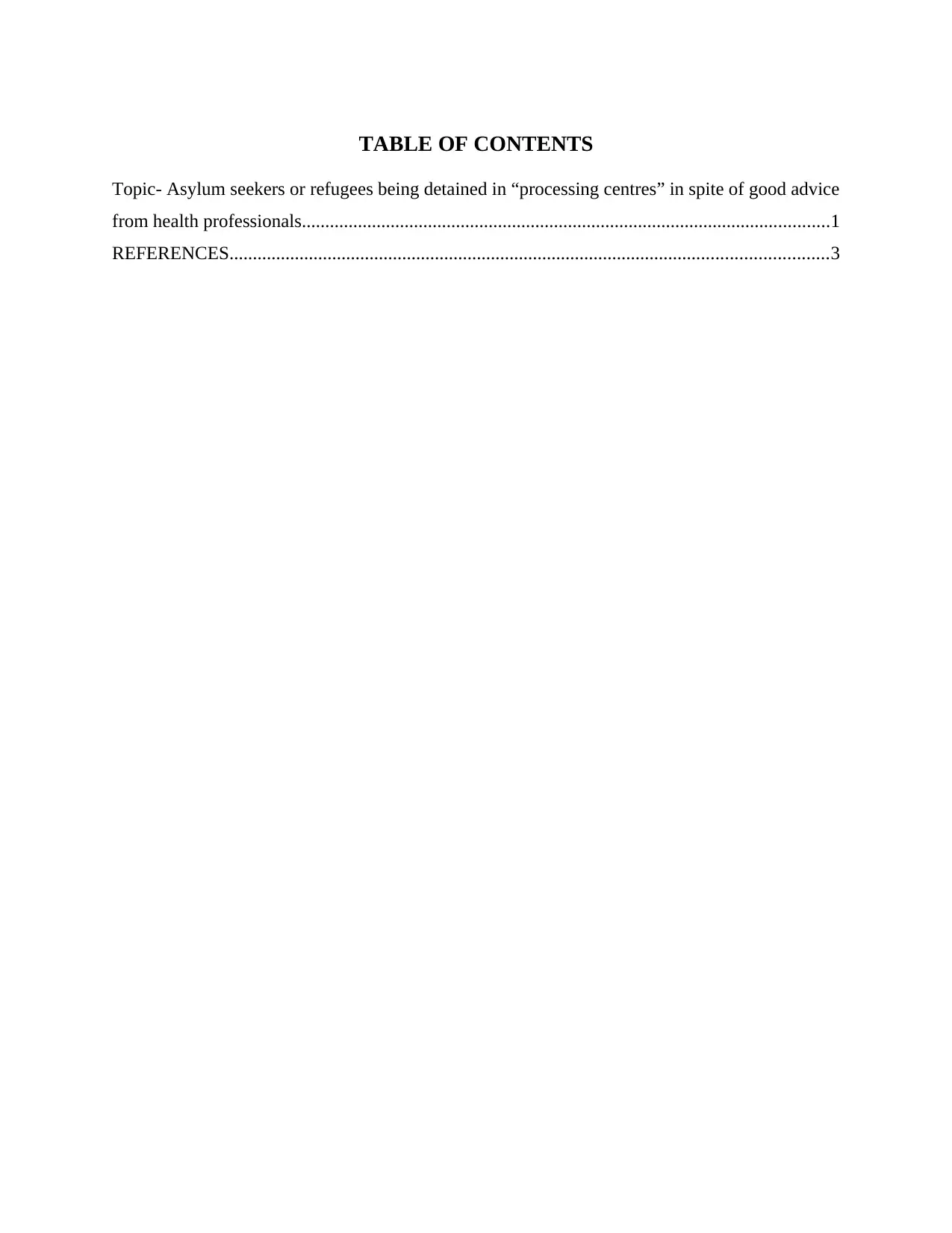
TABLE OF CONTENTS
Topic- Asylum seekers or refugees being detained in “processing centres” in spite of good advice
from health professionals.................................................................................................................1
REFERENCES................................................................................................................................3
Topic- Asylum seekers or refugees being detained in “processing centres” in spite of good advice
from health professionals.................................................................................................................1
REFERENCES................................................................................................................................3
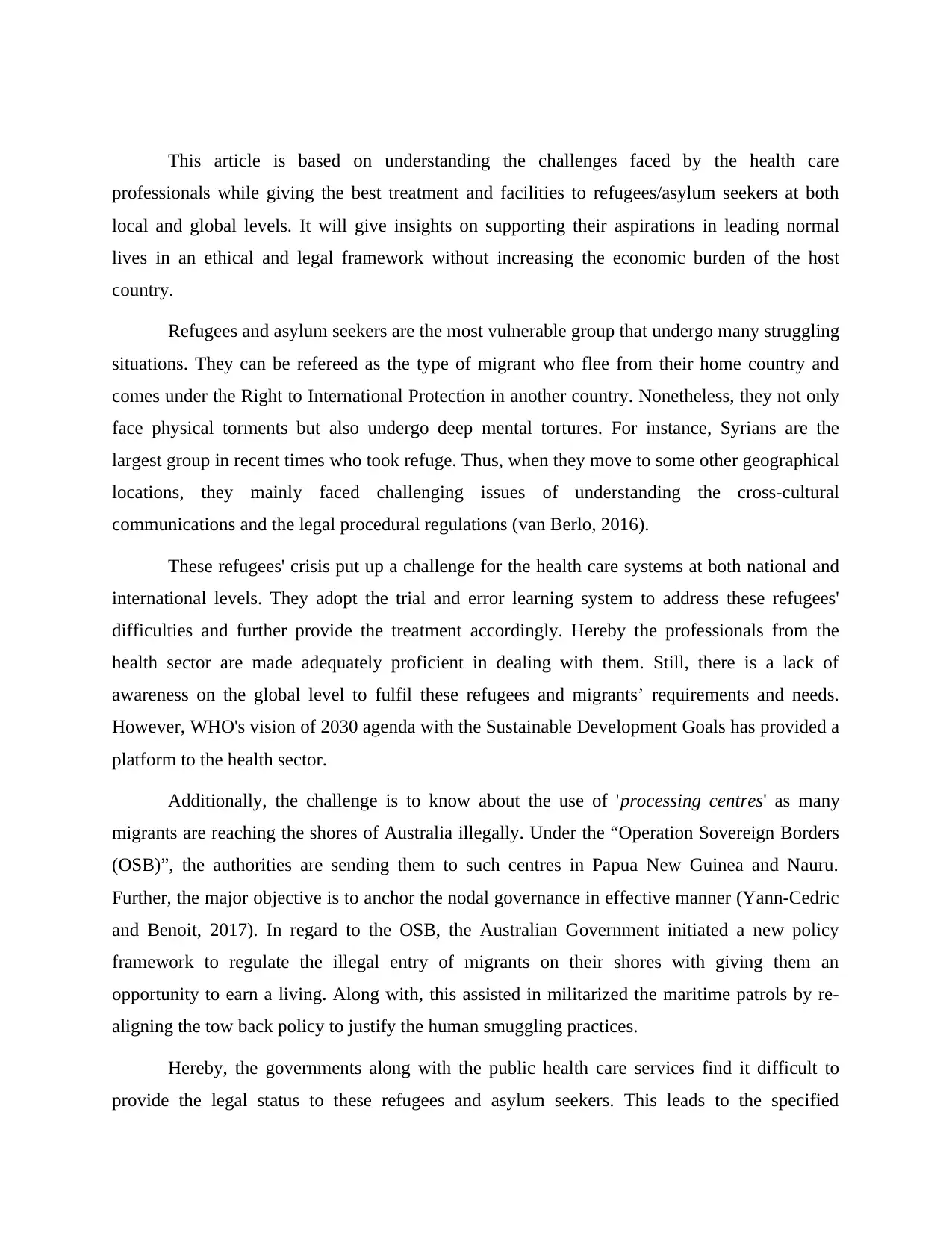
This article is based on understanding the challenges faced by the health care
professionals while giving the best treatment and facilities to refugees/asylum seekers at both
local and global levels. It will give insights on supporting their aspirations in leading normal
lives in an ethical and legal framework without increasing the economic burden of the host
country.
Refugees and asylum seekers are the most vulnerable group that undergo many struggling
situations. They can be refereed as the type of migrant who flee from their home country and
comes under the Right to International Protection in another country. Nonetheless, they not only
face physical torments but also undergo deep mental tortures. For instance, Syrians are the
largest group in recent times who took refuge. Thus, when they move to some other geographical
locations, they mainly faced challenging issues of understanding the cross-cultural
communications and the legal procedural regulations (van Berlo, 2016).
These refugees' crisis put up a challenge for the health care systems at both national and
international levels. They adopt the trial and error learning system to address these refugees'
difficulties and further provide the treatment accordingly. Hereby the professionals from the
health sector are made adequately proficient in dealing with them. Still, there is a lack of
awareness on the global level to fulfil these refugees and migrants’ requirements and needs.
However, WHO's vision of 2030 agenda with the Sustainable Development Goals has provided a
platform to the health sector.
Additionally, the challenge is to know about the use of 'processing centres' as many
migrants are reaching the shores of Australia illegally. Under the “Operation Sovereign Borders
(OSB)”, the authorities are sending them to such centres in Papua New Guinea and Nauru.
Further, the major objective is to anchor the nodal governance in effective manner (Yann-Cedric
and Benoit, 2017). In regard to the OSB, the Australian Government initiated a new policy
framework to regulate the illegal entry of migrants on their shores with giving them an
opportunity to earn a living. Along with, this assisted in militarized the maritime patrols by re-
aligning the tow back policy to justify the human smuggling practices.
Hereby, the governments along with the public health care services find it difficult to
provide the legal status to these refugees and asylum seekers. This leads to the specified
professionals while giving the best treatment and facilities to refugees/asylum seekers at both
local and global levels. It will give insights on supporting their aspirations in leading normal
lives in an ethical and legal framework without increasing the economic burden of the host
country.
Refugees and asylum seekers are the most vulnerable group that undergo many struggling
situations. They can be refereed as the type of migrant who flee from their home country and
comes under the Right to International Protection in another country. Nonetheless, they not only
face physical torments but also undergo deep mental tortures. For instance, Syrians are the
largest group in recent times who took refuge. Thus, when they move to some other geographical
locations, they mainly faced challenging issues of understanding the cross-cultural
communications and the legal procedural regulations (van Berlo, 2016).
These refugees' crisis put up a challenge for the health care systems at both national and
international levels. They adopt the trial and error learning system to address these refugees'
difficulties and further provide the treatment accordingly. Hereby the professionals from the
health sector are made adequately proficient in dealing with them. Still, there is a lack of
awareness on the global level to fulfil these refugees and migrants’ requirements and needs.
However, WHO's vision of 2030 agenda with the Sustainable Development Goals has provided a
platform to the health sector.
Additionally, the challenge is to know about the use of 'processing centres' as many
migrants are reaching the shores of Australia illegally. Under the “Operation Sovereign Borders
(OSB)”, the authorities are sending them to such centres in Papua New Guinea and Nauru.
Further, the major objective is to anchor the nodal governance in effective manner (Yann-Cedric
and Benoit, 2017). In regard to the OSB, the Australian Government initiated a new policy
framework to regulate the illegal entry of migrants on their shores with giving them an
opportunity to earn a living. Along with, this assisted in militarized the maritime patrols by re-
aligning the tow back policy to justify the human smuggling practices.
Hereby, the governments along with the public health care services find it difficult to
provide the legal status to these refugees and asylum seekers. This leads to the specified
⊘ This is a preview!⊘
Do you want full access?
Subscribe today to unlock all pages.

Trusted by 1+ million students worldwide
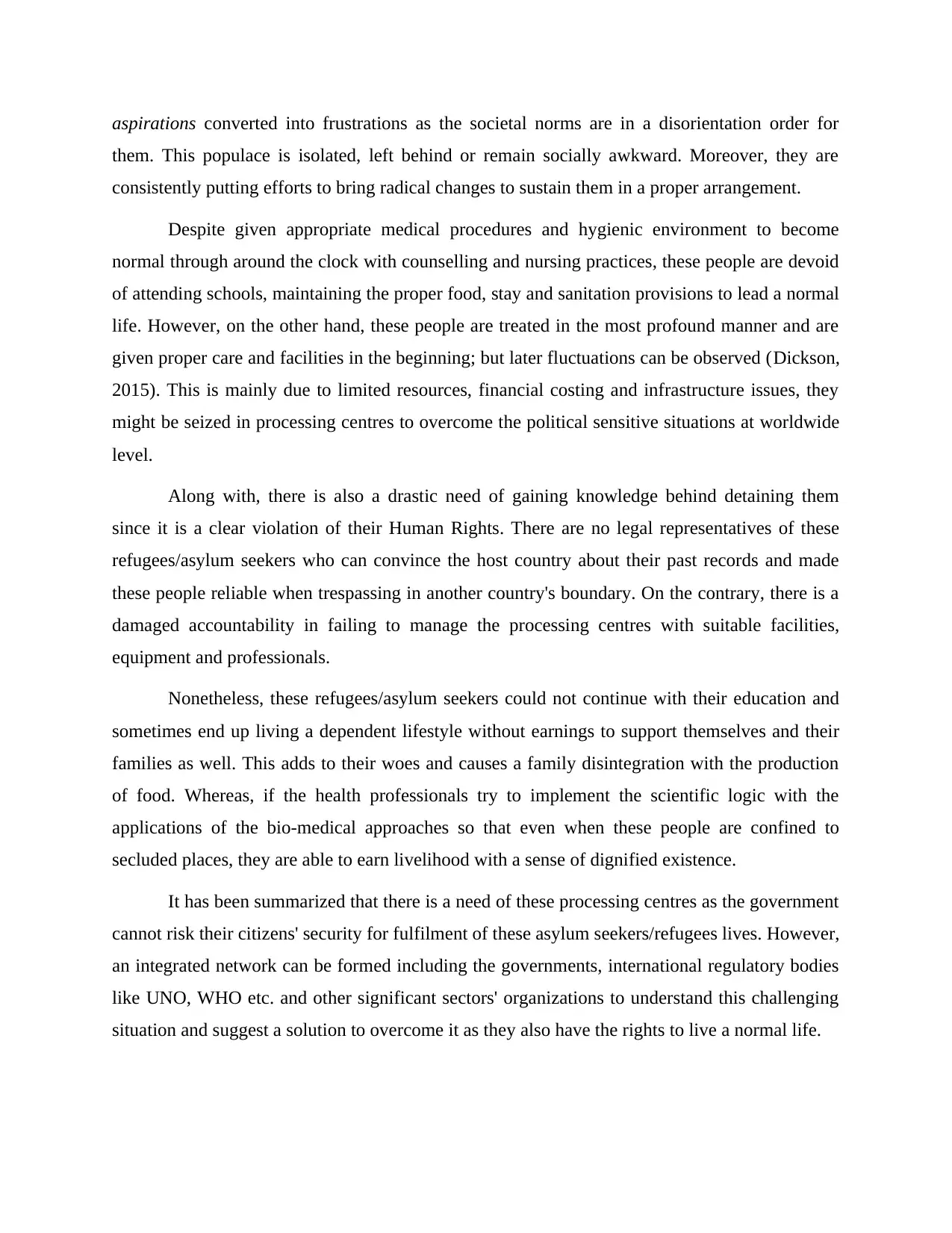
aspirations converted into frustrations as the societal norms are in a disorientation order for
them. This populace is isolated, left behind or remain socially awkward. Moreover, they are
consistently putting efforts to bring radical changes to sustain them in a proper arrangement.
Despite given appropriate medical procedures and hygienic environment to become
normal through around the clock with counselling and nursing practices, these people are devoid
of attending schools, maintaining the proper food, stay and sanitation provisions to lead a normal
life. However, on the other hand, these people are treated in the most profound manner and are
given proper care and facilities in the beginning; but later fluctuations can be observed (Dickson,
2015). This is mainly due to limited resources, financial costing and infrastructure issues, they
might be seized in processing centres to overcome the political sensitive situations at worldwide
level.
Along with, there is also a drastic need of gaining knowledge behind detaining them
since it is a clear violation of their Human Rights. There are no legal representatives of these
refugees/asylum seekers who can convince the host country about their past records and made
these people reliable when trespassing in another country's boundary. On the contrary, there is a
damaged accountability in failing to manage the processing centres with suitable facilities,
equipment and professionals.
Nonetheless, these refugees/asylum seekers could not continue with their education and
sometimes end up living a dependent lifestyle without earnings to support themselves and their
families as well. This adds to their woes and causes a family disintegration with the production
of food. Whereas, if the health professionals try to implement the scientific logic with the
applications of the bio-medical approaches so that even when these people are confined to
secluded places, they are able to earn livelihood with a sense of dignified existence.
It has been summarized that there is a need of these processing centres as the government
cannot risk their citizens' security for fulfilment of these asylum seekers/refugees lives. However,
an integrated network can be formed including the governments, international regulatory bodies
like UNO, WHO etc. and other significant sectors' organizations to understand this challenging
situation and suggest a solution to overcome it as they also have the rights to live a normal life.
them. This populace is isolated, left behind or remain socially awkward. Moreover, they are
consistently putting efforts to bring radical changes to sustain them in a proper arrangement.
Despite given appropriate medical procedures and hygienic environment to become
normal through around the clock with counselling and nursing practices, these people are devoid
of attending schools, maintaining the proper food, stay and sanitation provisions to lead a normal
life. However, on the other hand, these people are treated in the most profound manner and are
given proper care and facilities in the beginning; but later fluctuations can be observed (Dickson,
2015). This is mainly due to limited resources, financial costing and infrastructure issues, they
might be seized in processing centres to overcome the political sensitive situations at worldwide
level.
Along with, there is also a drastic need of gaining knowledge behind detaining them
since it is a clear violation of their Human Rights. There are no legal representatives of these
refugees/asylum seekers who can convince the host country about their past records and made
these people reliable when trespassing in another country's boundary. On the contrary, there is a
damaged accountability in failing to manage the processing centres with suitable facilities,
equipment and professionals.
Nonetheless, these refugees/asylum seekers could not continue with their education and
sometimes end up living a dependent lifestyle without earnings to support themselves and their
families as well. This adds to their woes and causes a family disintegration with the production
of food. Whereas, if the health professionals try to implement the scientific logic with the
applications of the bio-medical approaches so that even when these people are confined to
secluded places, they are able to earn livelihood with a sense of dignified existence.
It has been summarized that there is a need of these processing centres as the government
cannot risk their citizens' security for fulfilment of these asylum seekers/refugees lives. However,
an integrated network can be formed including the governments, international regulatory bodies
like UNO, WHO etc. and other significant sectors' organizations to understand this challenging
situation and suggest a solution to overcome it as they also have the rights to live a normal life.
Paraphrase This Document
Need a fresh take? Get an instant paraphrase of this document with our AI Paraphraser
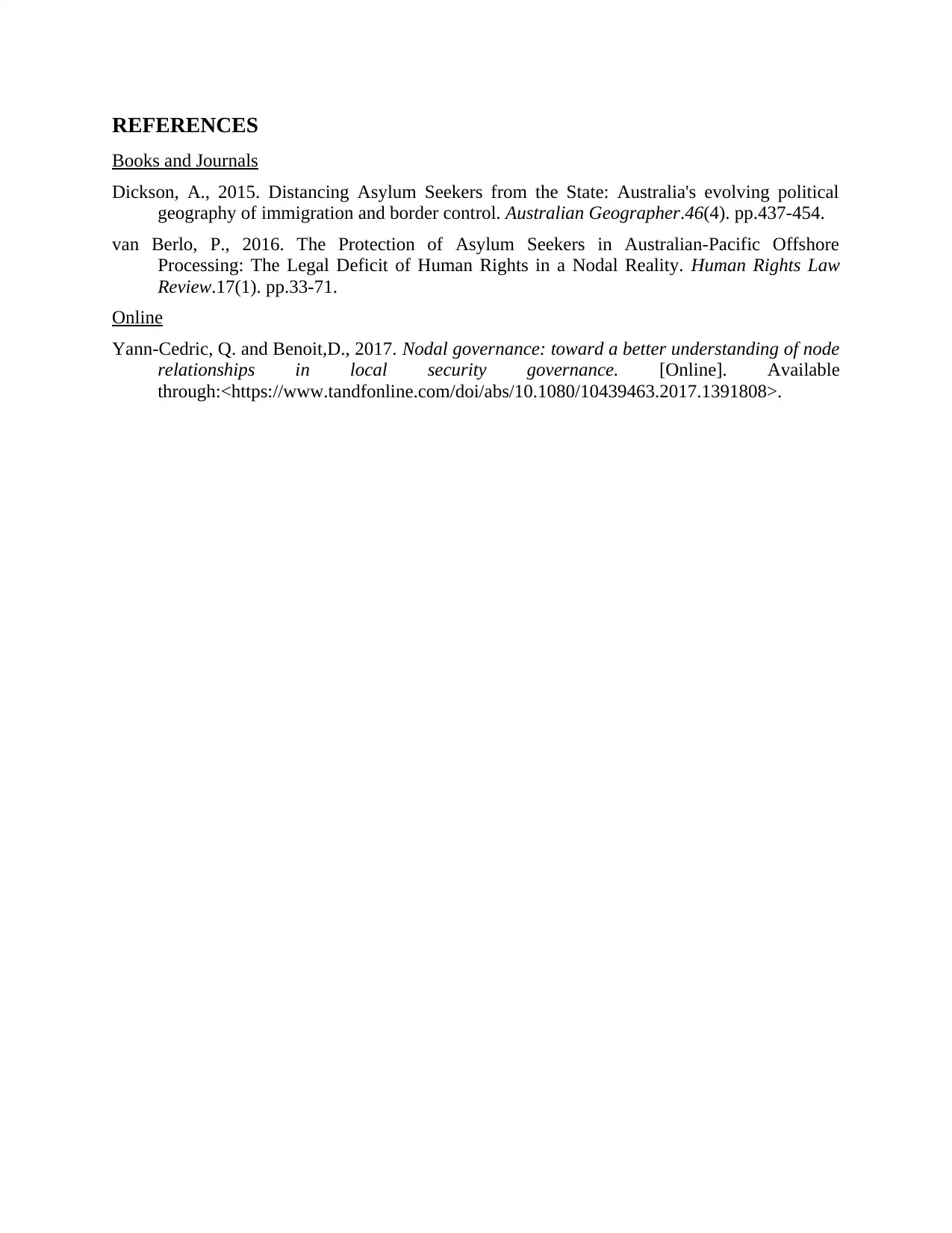
REFERENCES
Books and Journals
Dickson, A., 2015. Distancing Asylum Seekers from the State: Australia's evolving political
geography of immigration and border control. Australian Geographer.46(4). pp.437-454.
van Berlo, P., 2016. The Protection of Asylum Seekers in Australian-Pacific Offshore
Processing: The Legal Deficit of Human Rights in a Nodal Reality. Human Rights Law
Review.17(1). pp.33-71.
Online
Yann-Cedric, Q. and Benoit,D., 2017. Nodal governance: toward a better understanding of node
relationships in local security governance. [Online]. Available
through:<https://www.tandfonline.com/doi/abs/10.1080/10439463.2017.1391808>.
Books and Journals
Dickson, A., 2015. Distancing Asylum Seekers from the State: Australia's evolving political
geography of immigration and border control. Australian Geographer.46(4). pp.437-454.
van Berlo, P., 2016. The Protection of Asylum Seekers in Australian-Pacific Offshore
Processing: The Legal Deficit of Human Rights in a Nodal Reality. Human Rights Law
Review.17(1). pp.33-71.
Online
Yann-Cedric, Q. and Benoit,D., 2017. Nodal governance: toward a better understanding of node
relationships in local security governance. [Online]. Available
through:<https://www.tandfonline.com/doi/abs/10.1080/10439463.2017.1391808>.
1 out of 5
Related Documents
Your All-in-One AI-Powered Toolkit for Academic Success.
+13062052269
info@desklib.com
Available 24*7 on WhatsApp / Email
![[object Object]](/_next/static/media/star-bottom.7253800d.svg)
Unlock your academic potential
Copyright © 2020–2025 A2Z Services. All Rights Reserved. Developed and managed by ZUCOL.





